Neat … Oh.
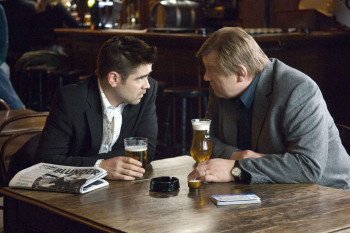 Early in In Bruges, the hit man Ken (Brendan Gleeson) is counting out coins, and he ends up 10 cents short of the admission price for a historic attraction. He pleads with the cashier to let him in, but the man insists that it costs five euros to get in. Exasperated, Ken pulls out a 50-euro bill. It’s a tantalizing bit of character color. But when that detail becomes important late in the movie, the life gets sucks out of it; it becomes a hollow contrivance instead of an ambiguous hint of a man.
Early in In Bruges, the hit man Ken (Brendan Gleeson) is counting out coins, and he ends up 10 cents short of the admission price for a historic attraction. He pleads with the cashier to let him in, but the man insists that it costs five euros to get in. Exasperated, Ken pulls out a 50-euro bill. It’s a tantalizing bit of character color. But when that detail becomes important late in the movie, the life gets sucks out of it; it becomes a hollow contrivance instead of an ambiguous hint of a man.

 It’s become apparent with The Dark Knight that dissent
It’s become apparent with The Dark Knight that dissent  A few caveats at the outset: Bad Dog Ginger was causing disruptions resulting from her intense interest in a cat at the drive-in, and five-month-old Emily was causing disruptions because her normal sleep schedule was itself disrupted. So I did not have the opportunity to concentrate fully on Pixar’s WALL•E. But I doubt that my attention would have been rewarded. Once the movie zooms to a bustling cruise (space)ship, WALL•E is fine, but it felt like Monsters, Inc. 2 – manic and bright and silly.
A few caveats at the outset: Bad Dog Ginger was causing disruptions resulting from her intense interest in a cat at the drive-in, and five-month-old Emily was causing disruptions because her normal sleep schedule was itself disrupted. So I did not have the opportunity to concentrate fully on Pixar’s WALL•E. But I doubt that my attention would have been rewarded. Once the movie zooms to a bustling cruise (space)ship, WALL•E is fine, but it felt like Monsters, Inc. 2 – manic and bright and silly. My distate for the stone-faced British comedian Rowan Atkinson is well-documented, as is my loathing for his signature creation, Mr. Bean. I like subtle, sophisticated verbal comedy as much as the next guy, but Atkinson takes it too far; I’ve been with people who stare at his almost subliminal act without a hint of a smile, unaware that the turkey-on-the-head routine is a joke.
My distate for the stone-faced British comedian Rowan Atkinson is well-documented, as is my loathing for his signature creation, Mr. Bean. I like subtle, sophisticated verbal comedy as much as the next guy, but Atkinson takes it too far; I’ve been with people who stare at his almost subliminal act without a hint of a smile, unaware that the turkey-on-the-head routine is a joke. Dawn is afraid of her body, but it’s the boys who are in trouble. She is a star in a local abstinence program – a heartfelt, eloquent advocate for preserving virginity – but she’s not immune to the temptations of the flesh. One night, while fantasizing about the cute boy she just met, her hand creeps down … but she can’t do it. Perhaps she knows instinctively what a handful of boys and men are about to discover in Teeth: She has a bloodthirsty vagina.
Dawn is afraid of her body, but it’s the boys who are in trouble. She is a star in a local abstinence program – a heartfelt, eloquent advocate for preserving virginity – but she’s not immune to the temptations of the flesh. One night, while fantasizing about the cute boy she just met, her hand creeps down … but she can’t do it. Perhaps she knows instinctively what a handful of boys and men are about to discover in Teeth: She has a bloodthirsty vagina.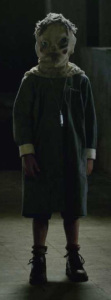 The Orphanage has one indelible image, and that’s plenty. It also has a sly current of grief and healing that hits home mostly on reflection, after cold recognitions and resonances sink in.
The Orphanage has one indelible image, and that’s plenty. It also has a sly current of grief and healing that hits home mostly on reflection, after cold recognitions and resonances sink in.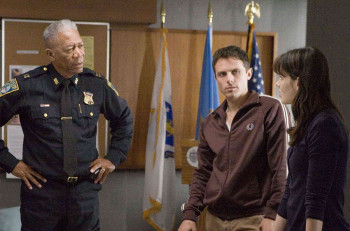 Roughly halfway into Gone Baby Gone, Ben Affleck’s directorial debut, the movie is finished. The plot involving a kidnapped youth has been apparently, tragically resolved. But the movie still has an hour left, a clockwatcher will tell you. And even if you’re not a person regularly calculating how the anticipated remaining X plot will unfold in the remaining Y minutes, you know that there’s plenty left to come.
Roughly halfway into Gone Baby Gone, Ben Affleck’s directorial debut, the movie is finished. The plot involving a kidnapped youth has been apparently, tragically resolved. But the movie still has an hour left, a clockwatcher will tell you. And even if you’re not a person regularly calculating how the anticipated remaining X plot will unfold in the remaining Y minutes, you know that there’s plenty left to come.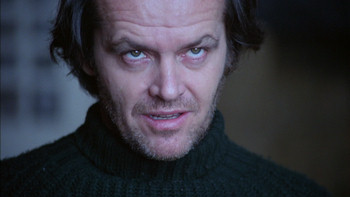 The turning point in The Shining comes when Jack Torrance encounters a woman in Room 237. Naked, lithe, and beautiful, she gets out of the bathtub and wordlessly approaches Jack. They kiss, but when Jack looks in the mirror, his arms are embracing a decaying old woman, flabby and with patches of her skin missing. It’s not your typical turning point. A heretofore pedestrian movie doesn’t begin to redeem itself, and a previously engaging work doesn’t go off the rails. Instead, things start to get muddled.
The turning point in The Shining comes when Jack Torrance encounters a woman in Room 237. Naked, lithe, and beautiful, she gets out of the bathtub and wordlessly approaches Jack. They kiss, but when Jack looks in the mirror, his arms are embracing a decaying old woman, flabby and with patches of her skin missing. It’s not your typical turning point. A heretofore pedestrian movie doesn’t begin to redeem itself, and a previously engaging work doesn’t go off the rails. Instead, things start to get muddled.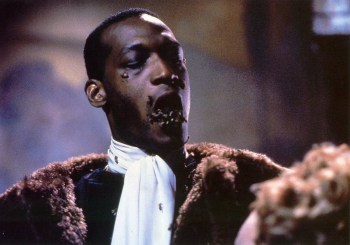 Candyman is an A movie desperately trying to break out of its B-movie body, like a 12-year-old boy wanting to prove his manhood. It is a slasher film, but it pushes and tugs and stretches to become something more. That it succeeds at all is pretty amazing.
Candyman is an A movie desperately trying to break out of its B-movie body, like a 12-year-old boy wanting to prove his manhood. It is a slasher film, but it pushes and tugs and stretches to become something more. That it succeeds at all is pretty amazing.